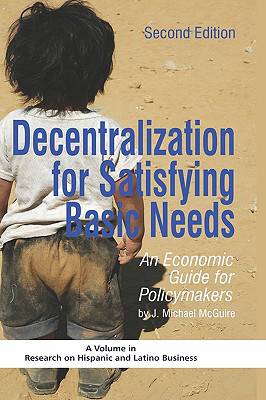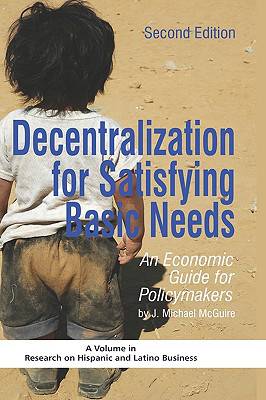
- Retrait gratuit dans votre magasin Club
- 7.000.000 titres dans notre catalogue
- Payer en toute sécurité
- Toujours un magasin près de chez vous
- Retrait gratuit dans votre magasin Club
- 7.000.000 titres dans notre catalogue
- Payer en toute sécurité
- Toujours un magasin près de chez vous
Decentralization for Satisfying Basic Needs
An Economic Guide for Policymakers (Revised Second Edition) (Hc)
J Michael McGuire
152,45 €
+ 304 points
Format
Description
A volume in Research on Hispanic and Latino Business Series Editors Michael William Mulnix and Esther Elena López-Mulnix More than one in every five Latin Americans lives on less than $2 a day, and Latin America is the most unequal region in the world. The book tackles the problem of poverty and inequality in Latin America through the novel approach of using the decentralization of government functions to satisfy the basic needs of the poor. Decentralization can bring government closer to the people and strengthen the voice of the voiceless. Satisfying basic needs for services such as education and health care enhances productivity and imparts an indispensable opportunity to earn an income sufficient to emerge from poverty and to live a full life. Part 1 describes the poverty and inequality of Latin America and the Basic Needs Approach to Development. Part 2 introduces a model of decentralization as a step-by-step process, and it shows the policymaker how to implement decentralization in stages through matching its various degrees with real-world circumstances. Part 3 enriches the understanding of policymakers by analyzing real-world cases of decentralization in light of the decentralization model. The second edition includes two new chapters that cover the important but often neglected topic of taxation for inclusive development. Chapter 8 analyzes the influential tax advice of the World Bank in terms of its effect on decentralization and the satisfaction of basic needs. Appendix B of Chapter 8 presents an empirical analysis in support of the chapter's argument that the Bank's policy is in need of revision. Chapter 9 analyzes the effects of the World Bank's tax advice on El Salvador's tax reform and development process. Two other chapters have been extensively updated: Chapter 6 records and analyzes the rapid evolution of Mexico's Oportunidades program for health, education and nutrition, and Chapter 10 evaluates the progress of the United States' innovative program for foreign aid, The Millennium Challenge Account. Throughout the book, tables and references have been updated.
Spécifications
Parties prenantes
- Auteur(s) :
- Editeur:
Contenu
- Nombre de pages :
- 214
- Langue:
- Anglais
- Collection :
Caractéristiques
- EAN:
- 9781607524113
- Date de parution :
- 03-02-10
- Format:
- Livre relié
- Format numérique:
- Genaaid
- Dimensions :
- 156 mm x 234 mm
- Poids :
- 476 g







